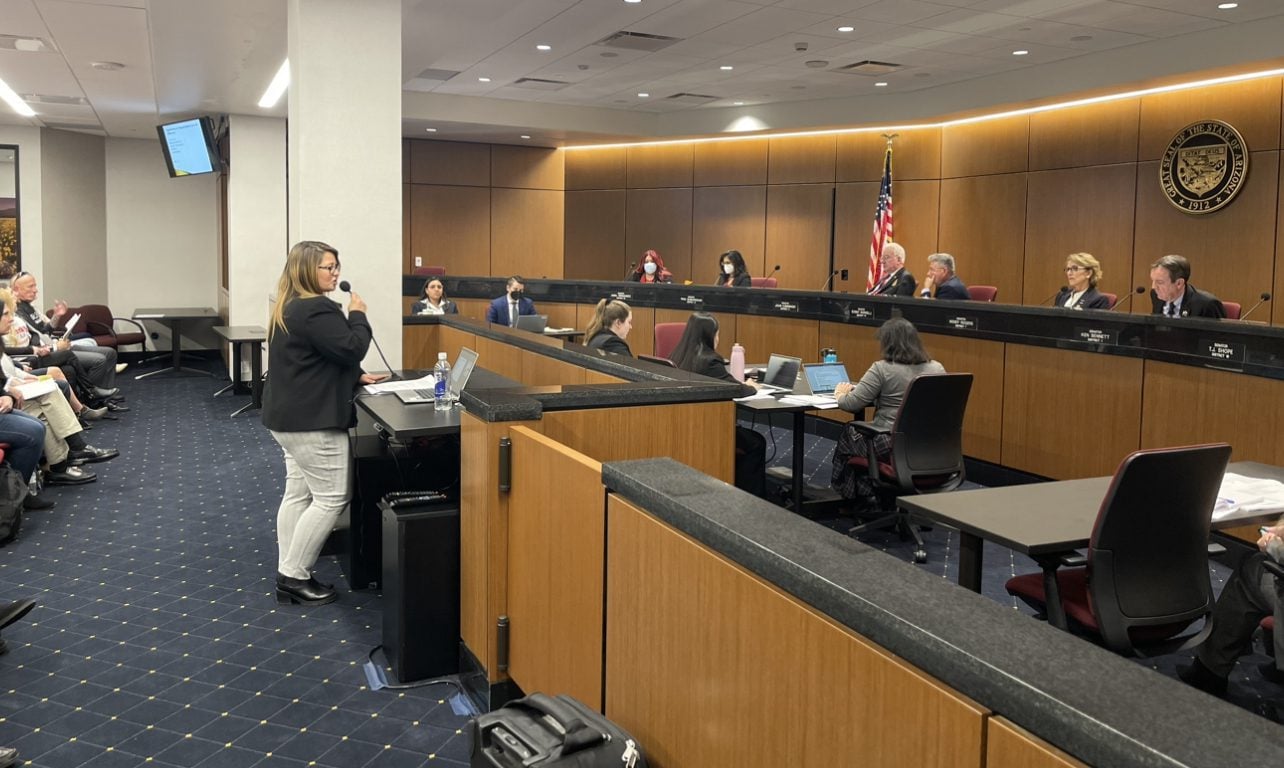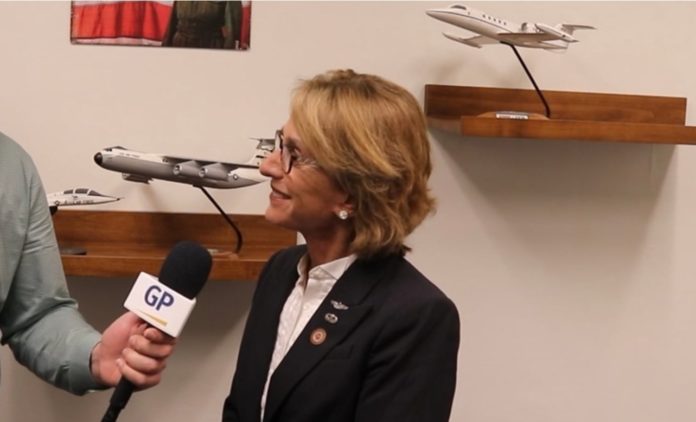
Shelby Busch gives bombshell presentation to Arizona Legislators
The Gateway Pundit correspondent Jordan Conradson spoke to Arizona State Senator Wendy Rogers on Monday, following a bombshell presentation in the Arizona Senate Elections Committee on 2022 Election failures in Maricopa County.
Senator Rogers chairs the newly formed Arizona Senate Elections Committee. Elections were previously under the purview of the Senate Government committee.
“Because elections have become so important, and honestly, the issue is so contentious, there’s a separate committee dedicated to this,” said Rogers.
We The People AZ Alliance co-founder and chairman Shelby Busch gave an outstanding presentation detailing the group’s investigative work into voting machine or ballot printer failures and the potential voter fraud that occurred while “verifying” ballot signatures. Their critical investigative work is featured in Kari Lake’s lawsuit against the corrupt 2022 election results.
Maricopa County Superior Court Judge Peter Thompson dismissed eight of ten counts before Lake’s trial on December 21. One of the dismissed counts included Lake’s request for “An opportunity to inspect Maricopa County ballots from the 2022 general election, including ballot signature envelopes and the corresponding signatures on file with Maricopa County, prior to trial.”
Thompson dismissed the lawsuit on Christmas Eve, despite the evidence of massive voter disenfranchisement and machine failures targeting Election Day voters who turned out 3:1 for Republicans, County Elections officials’ false testimony regarding the failures, and his own refusal to let the evidence be presented.
The Gateway Pundit reported on some of the shocking findings in the investigation, including Election Day tabulators reportedly rejecting nearly 1/4 million vote attempts on election day. Busch revealed in the presentation that “tabulators failed at 235 times the Election Assistance Commission’s regulated failure rates.” Previously, Maricopa County attempted to claim that less than 18,000 ballots were affected by machine failures at just over 30% of vote centers.
Busch’s team also determined that over 127,000 ballot affidavit signatures were egregiously different than the signature on file, and over 163,000 signatures failed the Arizona Secretary of State’s standards for signature verification in 2022.
298,000 Election Day drop-off ballots were calculated to be counted in an average of eight seconds each, “which is completely unrealistic,” said Senator Rogers
This is similar to a finding by former Arizona Attorney General Mark Brnovich that signature verification standards were significantly decreased in the 2020 election, and “Maricopa County failed to follow the EPM procedures when transporting 20% of the early ballots from drop box locations to MCTEC.”
Due to the large volume of mail-in ballots in the 2020 election, the limited training of elections workers, and time restrictions, the AG’s office determined that 206,648 early ballot signatures were verified on November 4, 2020, with an average time of 4.6 seconds per signature. However, no action was taken to shore up signature verification standards by the Legislature or the Attorney General.
In the interview below, Senator Rogers discusses the over 500,000 estimated ballots in question.
The Senate Elections Committee will meet again on Monday to hear We The People AZ Alliance’s’ Election Mechanics Part 2′ presentation. “We have more that will be shined upon,” said Rogers.
View PDF files of the full presentation and exhibits of evidence at WeThePeopleAZAlliance.com. Watch the full presentation filmed by MAAP Real Talk Show here.
Conradson: There were 290,000 bad signatures accepted and counted. There were almost a quarter million ballots rejected by tabulators on election day. What are your key takeaways? What does all this tell you about this election?
Rogers: This was the first opportunity for me to chair the Senate Elections Committee, which is a different committee than what we had last year; we had the government committee which all of this was subsumed under. But, because elections have become so important, and honestly, the issue is so contentious, there’s a separate committee dedicated to this. So, we had a packed house, which was a real honor for me, a lot of my constituents came from all over my district in Arizona. We wanted to present two issues today, as you alluded to. We wanted to talk about signature verification, which was ruled out of Kari Lake’s lawsuit when her lawyers presented it to the Maricopa County Superior Court. That was one of the eight issues that were dismissed. And so it also was due to the fact that we’ve had information come to light very recently. So, we saw so many anomalous, incorrect, illegitimate signatures that were mismatches. And this amounted to just an inordinate number of ballots that really would not have passed through had they been looked at in the amount of time that it takes to look at a signature to verify it. Shelby Bush’s team figured out that each signature had to have had only eight seconds to be verified, which is completely unrealistic. It’s about a 30 to 45-second procedure. So, the bottom line is there was such a crush of ballots that these signature verifications either didn’t happen or were just passed through with a glimpse. And then the other issue that we looked at today, is, as you said, the tabulators and how they failed on election day to just such a high degree that it’s questionable that we can count on what happened in this election.
Conradson: I agree. It really is a total failure of our election system. You said that you think this is going to help Kari Lake’s lawsuit. I think so too, if the appeals court allows her to inspect the ballot signatures. However, what is the Arizona Senate going to be doing moving forward from this?
Rogers: Well, we’re going to entertain legislation that we hope will address these things. And this is what Shelby Bush spoke to, the invalidity of the signature verification. And then, of course, Dr. Daugherity from Texas, flew in, which was very kind of him, as a subject matter expert on the rejection of the tabulator machines. So I want to be clear to everybody, we didn’t do this, per se, to help any lawsuit or that lawsuit. What we did was, as a Senate, bring out information into the public domain that is germane to this situation. And as I said earlier, this is information that’s newly become available, in some cases just in the last two weeks. And so, it is our job as elected officials to get this out into the public domain. And again, I’m a rural legislator. I represent four counties that are not Maricopa County. So my constituents want me to find out what happened in Maricopa County to right the ship of state back on track, if you will, so that they are not disenfranchised.
Conradson: I want to talk about Maricopa County for a second. They don’t want to answer any of these questions. They don’t want to fix their systems, and matter of fact, Stephen Richer, the Maricopa County Recorder, came out with this proposition for legislators to change election laws and actually make the early voting period longer and make chain of custody more open than it already is. With all of this just being presented today, what does that tell you now? Do you think he’s just trying to make it easier to cheat?
Rogers: Well, I think that that was timed to possibly, perhaps, answer the mail, if you will, maybe to sort of look good. But, what I think it has pointed to is the need to have more practices that shore up the system. And so that’s why we have brought all of this out. At a time when everybody is talking about election integrity, these SLOGs and these cast vote records and these kinds of data-intensive packages, that only experts like Shelby bush and her team of 150 people. I had no idea until this morning when she dry-ran her presentation with me, and I was really firm with her to make it understandable to the general public because if I don’t understand it, nobody’s going to understand it. And so I worked with her for several hours. She is a real expert, but sometimes experts sort of need to boil it down to the basics. And I think that’s what we tried to do for the American people and for Arizona today on our committee, and by the way, it is available online.
Conradson: In your district, you represent four rural [Counties], what are they saying about Maricopa County’s utter disregard for election integrity and election security?
Rogers: Well, I was home this past weekend in Flagstaff, and we had the fourth-largest snowfall in Flagstaff history. So, my neighbors had time to talk with me between shoveling feet of snow, and they would tell me that they are very frustrated, that they don’t feel represented, and they feel that their vote was stolen.


